Studies indicate that nature heals. Getting outside and being active has a wide variety of physical and mental health benefits. Outdoor recreation has been shown to improve focus and self-esteem while lessening anxiety and stress. It’s truly miraculous what the simple act of getting outdoors can do for a person’s overall well-being.
That’s why we, at the Breckenridge Outdoor Education Center (BOEC), find great purpose in getting people from all walks of life outside to experience all that the great outdoors has to offer. And this includes an often neglected segment of the population, youth that are challenged with risk factors in their lives. For the past 27 years, BOEC has partnered with Summit County government’s Youth and Family Services to provide life-changing experiences for these young boys and girls in the form of the Summit Outdoor Adventure Program (SOAP), created by two former BOEC staff members, one of whom is still with the program today.
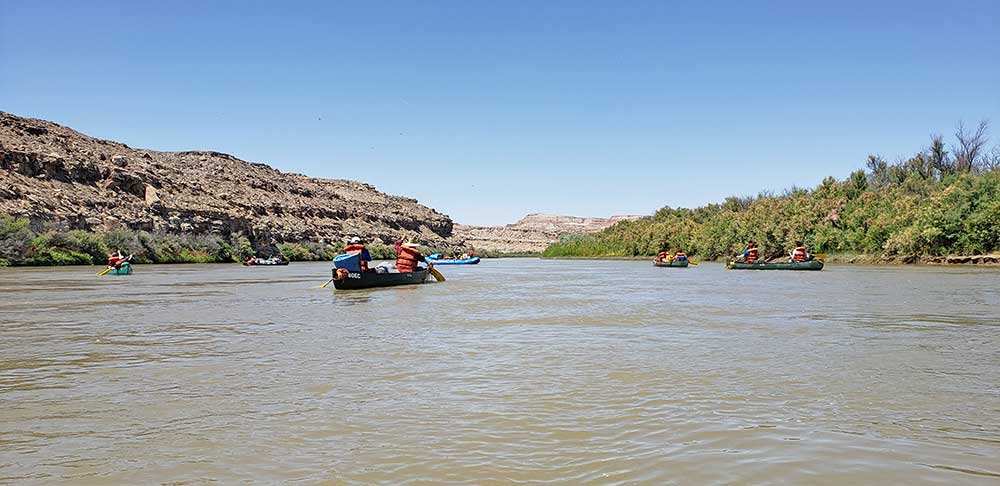
A group of SOAP participants canoes the Green River.
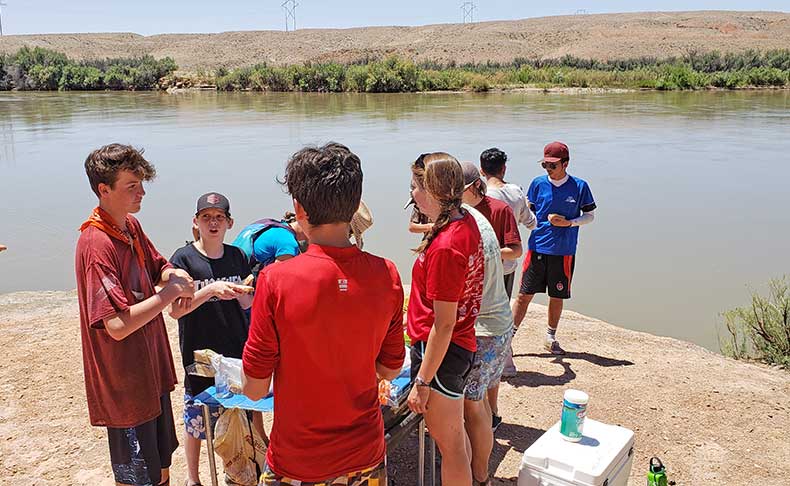
Boys SOAP participants gather for lunch along the Green River.
Robin Albert, SOAP manager and creator, began her BOEC journey in 1994 as a course staff member before advancing to assistant course director and finally course director. Also working as a program coordinator with Mountain Mentors at the time – an organization tasked with positively influencing the youth of Summit County to lead healthy lifestyles – Robin was accustomed to working through the complexities that accompany adolescent life. But it wasn’t until she met former BOEC Wilderness Director and Outward Bound Instructor, Bob Bond, that the idea for SOAP started to take shape.
The plan was to create a program for young people that combines community service, leadership, and personal responsibility while utilizing the aforementioned positive benefits of the great outdoors as its canvas. While traditional youth programming was readily available, Robin and Bob both saw a need for a program with more structure and intention to challenge these youth, often described as “children who are less likely to transition successfully into adulthood.” So, the two self-starters put their heads together and built upon each other’s strengths… Bob, the visionary, with his many years working in the wilderness with youth who have challenging personalities, and Robin with her passion and community connections to make that vision a reality. It was a universal connection that seemed meant to be.
“We practiced a lot over the many years that we worked at the BOEC together, to meet the needs while providing a quality and effective experience for youth,” says Albert, a New England native. “Bob was a mentor to me. He brought his Outward Bound experiences to the table while I shared the needs of youth and some of my ideas. I didn’t have experience back then, just the passion to do and help. Bob funneled that passion and we really fine-tuned SOAP into a reliable program that has a big impact on the youngsters.”
With this unique collaboration in place, SOAP was born in 1995 and has been a staple of the BOEC Wilderness Program ever since. Any individual, ages 12-18, can participate in the program, but the majority of participants come from the four-county region of the 5th Judicial District – Lake, Eagle, Summit, and Clear Creek counties. Human service agencies, parents, and the judicial district all provide referrals to the program, but at the end of the day, for it to work, Albert says it simply comes down to the participants wanting to do it.
“The focus has always been on building upon the gifts that are inherently within each and every one of us,” says Albert. “When an adolescent has that gift reflected back at them, wow, potential is not only realized, but used to increase self-concept and a sense of purpose in the world.”
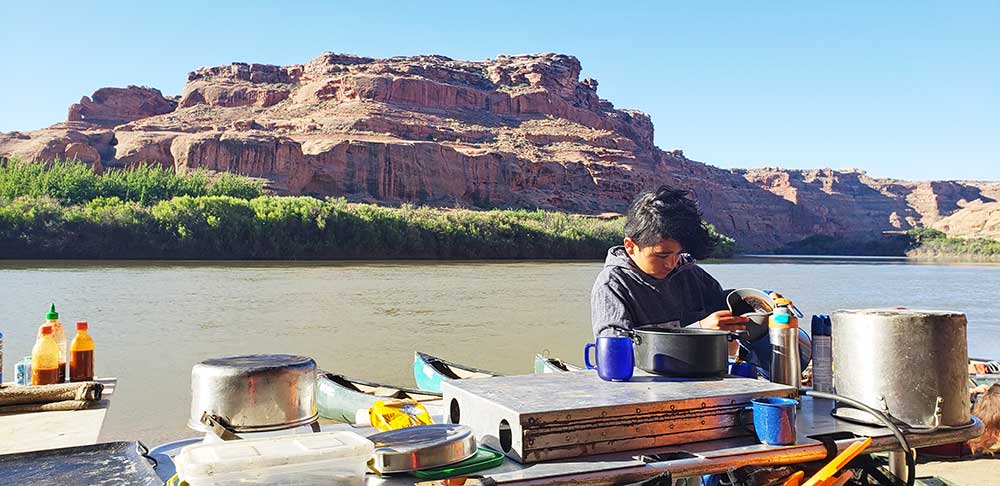
A young participant fixes himself some early morning coffee
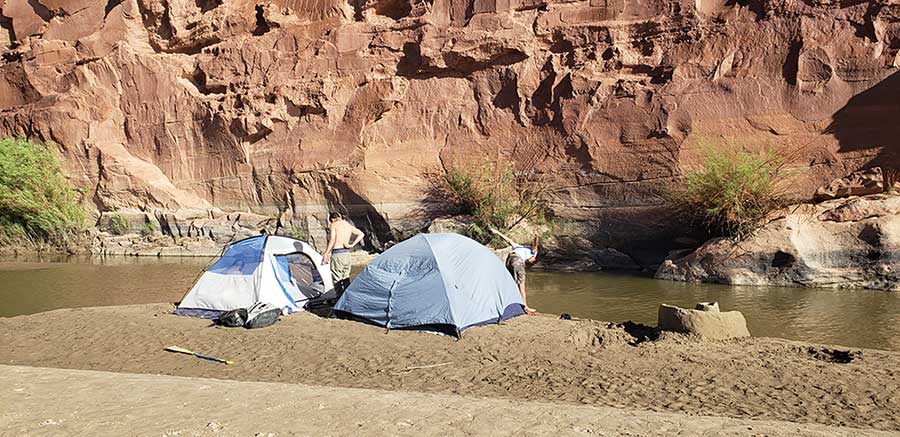
Part of the SOAP experience is camping overnight in tents.
The mission of changing lives is accomplished by getting the participants out on a two-week wilderness “adventure” with the longest-standing format being a desert/river model. With a separate boys and girls trip each summer, the groups spend two days on the Green River in Utah, three days “working” at Ruby Ranch, a vast acreage on the side of the Green River about 30 miles off interstate 70, doing service projects such as moving rocks, mending fences, and feeding cows, then another seven nights back on the river. While tackling this immersive experience – whether they know it or not – these young people learn a variety of skills that will ultimately help them develop confidence and leadership skills. Things like river and land navigation, equipment use and care, paddling and rowing skills, cooking, cleaning, teamwork, socialization, self-reflection, problem-solving, and conflict resolution are all on the menu. It truly is a smorgasbord of life-changing experiences for staff and participants alike.
Current BOEC Wilderness Director, Jaime Overmyer, can attest to the program’s transformative effects as she says, “It was one of my first courses as a BOEC intern and it definitely changed my life. We were out for two weeks with a bunch of teen girls who came from all different backgrounds with different stories and struggles. Finding ways to connect with them proved to be very challenging as they generally didn’t trust adults. It was amazing to see the group develop over the trip and it was so meaningful to show them something beautiful and powerful and see them let their guard down and be young people out having fun on a river. I still think it was my favorite of all the courses I ever had the privilege of being assigned.”
Past instructor, Nick Story, who is now a team leader for the Bodo Mediation Initiative – the cleanup, remediation, and restoration of an oil-polluted site in the Bodo community in Nigeria – can also attest to the life-changing effects of the SOAP program. However, Nick relates to both sides of the coin as he became an instructor after going through the program itself as an adjudicated youth. He credits his experiences, without knowing it at the time, as preparing him well for the successful environmental career he has today.
“There was something about taking on a leadership role in this environment and context that has stuck with me since,” he says. “I guess it’s a mix of many things. The confidence to lead in a team environment, the ability to follow and be accountable for myself and others if need be, an appreciation for a hard day’s work followed by a good meal with friends, at least a nominal sense of what integrity means, and, of course, a more than healthy awe and respect for nature. Instructing for SOAP helped me realize how much we need to protect ‘wild’ places such as Labyrinth and Stillwater Canyon, and also how transformative the life-changing complexion of nature can be for any person, adjudicated or not.”
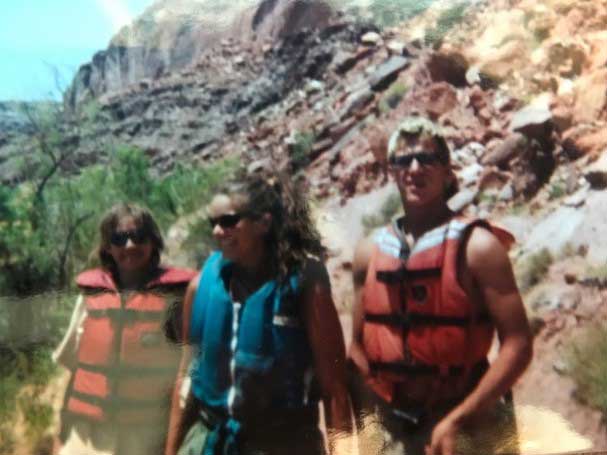
SOAP instructors pose in 1999, including Robin Albert (center) and Nick Story (right).
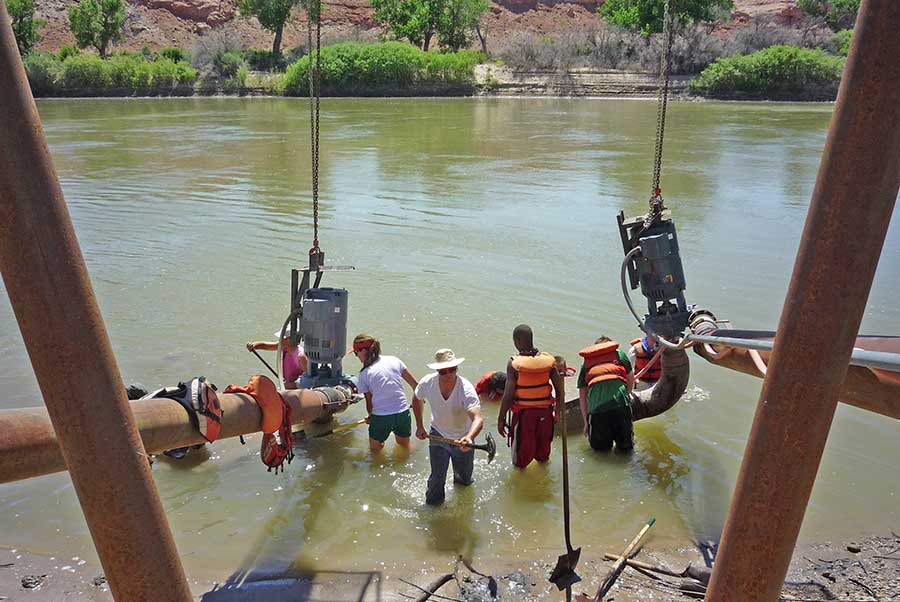
Boys participants working on a service project in 2012 as part of the program.
Joe Kusumoto, professional photographer and former BOEC program manager, grew up on the edge of a low-income neighborhood in the inner city, and at one point during his teenage years, was hanging out with a crowd whose paths were leading to crime and drugs. Luckily for Joe, however, he had a solid family support system to rely on, who placed an importance on him taking part in outdoor activities such as Boy Scouts, skiing, and boating. He credits the outdoors as changing his life for the better, which, in turn, offered him a unique perspective as a SOAP instructor where similar opportunities are provided to young people at the same pivotal point in their lives.
“14 days in a canoe in the desert during the hottest, most hostile part of the year is a challenge for everyone,” he says. “Staff and participants, alike, are pushed to their limits and most people on the trip will experience some of their most uncomfortable moments, both physically and mentally, during SOAP. I know I have. But, confronting and dealing with these shared challenges builds skills and confidence. I’ve seen boys move from struggling with these skills to mastering them and becoming more confident and start to take pride in what they’re doing.”
And while Joe relishes the importance of facing adversity head-on, it’s the aftermath of this tribulation that he sees as one of the greatest rewards – for everyone involved – the joy and appreciation one gets after passing through one of these tough times.
“For the boys on the Green River, it may be floating on a windless day on the river and swimming in the cool water,” he says. “Or getting to the top of the bowknot hike looking down on the expanse. Or, after two weeks in the desert, finally getting to enjoy an ice cold drink.”
Joe brings it full circle to his own childhood experiences and how he outmaneuvered a life of crime and drugs.
“I always believed the outdoors could provide an alternative to the excitement and rush of crime and drugs that so many young adults are drawn to,” he remembers back. “While the adrenaline rush of someone’s first rappel, or making it through a class IV rapid, may provide an initial replacement, it’s so much more than that. What I didn’t realize until doing many years with the program is that the real lasting impact comes from building confidence in one’s self.”
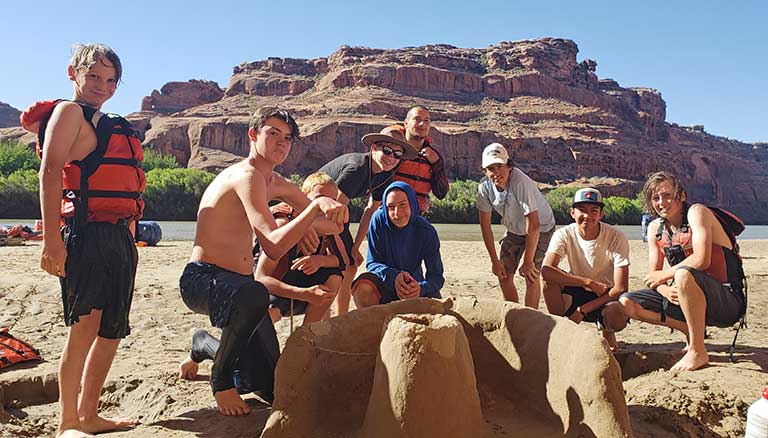
A boys SOAP group poses along the banks of the Green River.
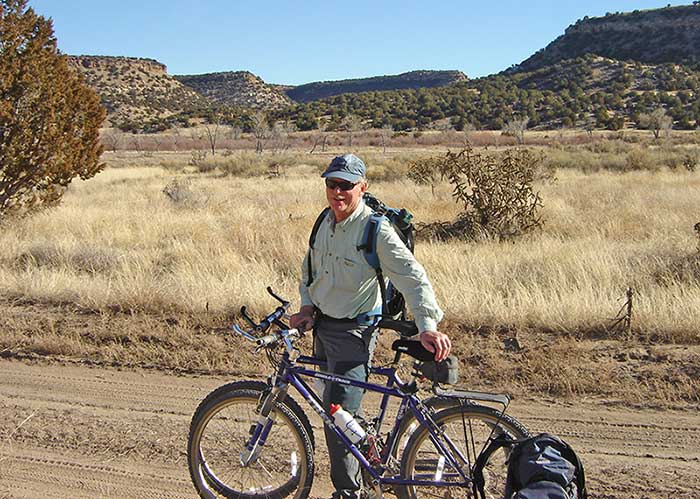
Program co-founder, Bob Bond, poses with his bike.
Since its inception, though, perhaps this program might have rubbed off on Robin the most.
“I continually learn empathy, humility, and what it means to be a human being on this planet,” she says. “My heart breaks a lot, but it also grows stronger in hope and resiliency. I have witnessed the tiny sparks of self-reflection grow into identity and purpose in so many lives. Through SOAP, I get a reason to believe in the simple goodness in every living person. It’s there, it may not be obvious at first, but it grows with every connection to rocks, trees, rivers, and those people on the journey with you.”
And the human beings on those journeys with Robin may transform right before her eyes, but most of the time it takes years to realize. Carl, 23, participated in Youth and Family Programs from the age of nine to 16, including the Mountain Mentors Program, The Youth Recycling Program, and two SOAPs, one with the BOEC. Now seven years removed and looking back on his experiences, the recent college graduate may have reached a point of self-actualization and is looking to give back according to a recent letter sent to the BOEC.
“I participated in many of your programs as an adolescent, mostly for disciplinary reasons,” Carl writes. “These experiences really helped me make something of my life and I just wanted to see if there was anything I could do to repay. I am trying to give back what I owe to society for all my debts when I was learning life. I am really interested in helping troubled youth because the BOEC (and SOAP) changed my life in that respect. Thanks again for everything!”
Luke Desrosiers, 21, participated in his one and only SOAP trip in 2019 after he had just graduated from high school. Having trouble getting off of probation for a Driving With Ability Impaired (DWAI) offense, the Gypsum, CO resident was given the option to attend SOAP in order to pass his drug screenings and finish up his community service hours. Now a shift lead and kitchen manager at Moe’s Original BBQ in Eagle, Luke credits the program for making an immediate impact on his life.
“I was at a crossroads,” he says. “I was having trouble coming to terms with the fact that I needed to get a job, step away from the drugs, and be more productive in life. It (SOAP) made me realize that I enjoy moving forward and confronting the problems that I was facing. It made me a lot more prepared to face reality and encouraged me to push myself out of my comfort zone to take those first steps to move forward and open new opportunities for myself.”
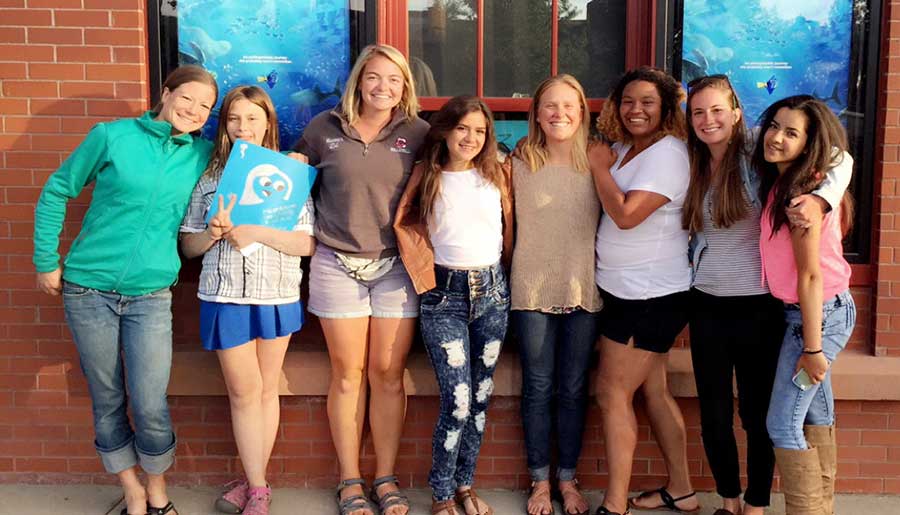
A girls SOAP group poses for a picture.
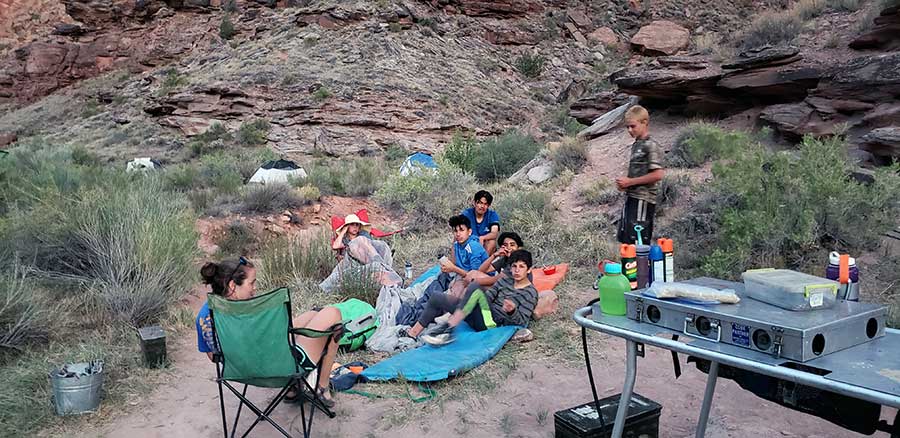
Camp life.
Elizabeth Luna, now a behavioral health navigator at the Summit Community Care Clinic, participated in both 2009 and 2010 and was in a unique position. As an aspiring psychology student at the time, Mountain Mentors provided her and a few other young women with the opportunity to join the program with a group of young women facing their challenges. She points to the experience as a big reason why she is working in behavioral health today, and working towards enrolling in college to get her Bachelor’s degree in psychology.
“It was great just having someone to take you out and have that experience and see a new place,” she says. “We all learned how to be compassionate towards others, how to interact with one another, and it got us all to reflect on ourselves and how we want to be treated and to treat others the same way. Learning life skills, discipline, and the values of teamwork were just icing on the cake.”
As you can tell, many of Robin’s past participants and instructors are thriving, but the program – and those that have needed the benefits of the program the past couple of years – have been sincerely affected by the COVID-19 pandemic. It has created a phenomenon of isolation and separation from one’s peers, which, in turn, has generated a need for more SOAP programming which has simply not been possible because of strict social distancing guidelines. As a result, according to a local Healthy Kids Colorado Survey, Summit County has seen depression rates increase at a significant rate in the last two years. Many teens have also resorted to connecting virtually with devices that, according to Albert, may placate, but not fulfill. She urges this demographic to get back to nature, discover, and play.
“People are feeling disconnected, lost, and stressed, even amidst all this beauty,” says Albert. “We need to reconnect ourselves and our youth in this community. The programs at the BOEC use the natural surroundings to help all people reconnect. I’ve seen it happen to some of the toughest, closed-off youth so I know it works. I know this program is the perfect treatment for the sadness and loss we are all feeling at this time.”
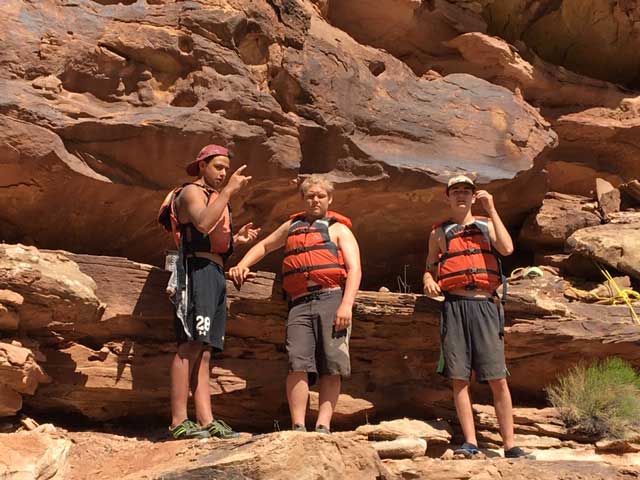
Boys hanging out on the cliffs.
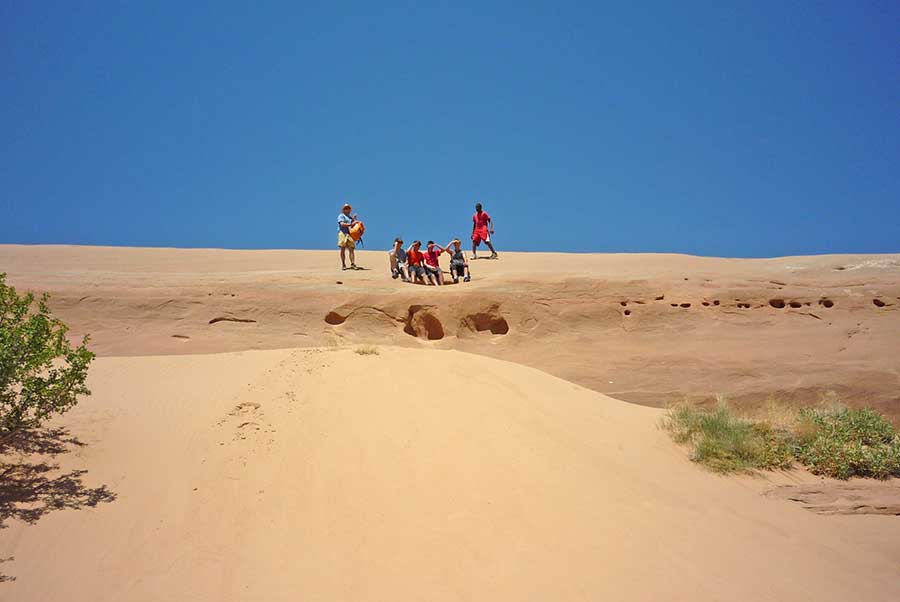
The boys taking in the view from the cliffs above the sand dune.
So, for last summer and this upcoming season, SOAP is back to save the day, albeit in a somewhat different manner. The traditional 2-week model has been abandoned for a “mini snapshot of SOAP in a day,” or single-day experiences that feature a half-day of service projects combined with a half-day of outdoor educational adventures. But the goal remains the same… to make a difference and change the lives of adjudicated and other youth at risk. Robin, however, has mixed feelings about the new program format.
“These mini courses have gone well, but the true connection is missing,” she states. “Is it valuable to them to complete their hours of community service? Yes. But is it arguably more valuable for youth to make a connection with a caring adult that may change the trajectory of their life? Definitely.”
In addition to the pandemic – now endemic – disrupting the SOAP process, another complicated issue has also risen to the surface… funding. As the program is a part of Summit County Youth and Family Services that has typically relied on state government funding to provide scholarships for these youth, the state of Colorado is currently not placing a high emphasis on programs without approved “evidence-based” practices – programs and curriculum that are studied by Universities for long periods of time. While Robin argues that programs like Outward Bound (and SOAP) have had numerous studies on the improvements in the self-esteem of its participants, it comes down to the fact that wilderness programming takes intentionality, time, effort, and money to be done right.
“Funders want the biggest bang for their buck and this is not a cheap or fast process at all,” Robin says. “Because states don’t put our model on their evidence-based practices funding list, it has eliminated our government funding. Some philanthropic agencies do, however, value the local, qualitative data that is collected, and fund groups to attend wilderness programming. So, I will need to start looking at private foundations that believe in our model to continue to get scholarships for youth to attend.”
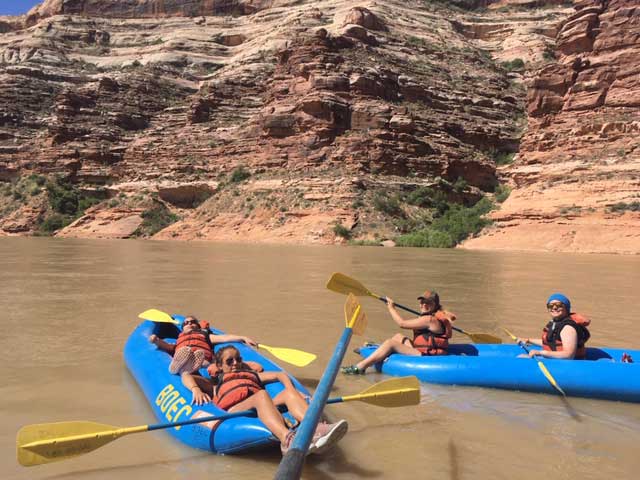
A lazy river day.
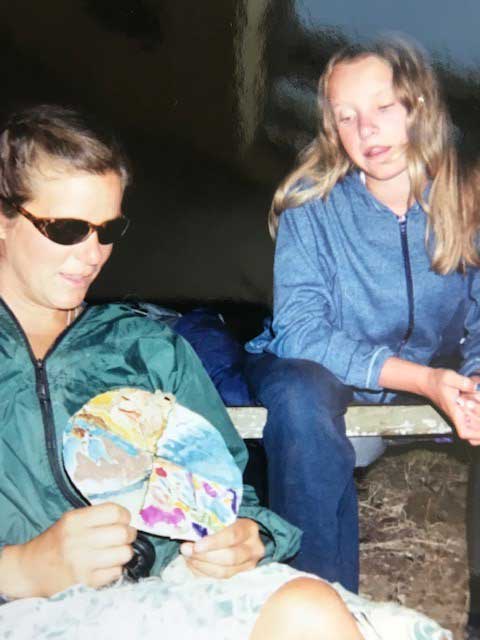
Robin Albert and a girls SOAP participant in 2000.
What does this look like? Nobody knows for sure, but Robin would like to see SOAP continue to create access to programming with youth who wouldn’t otherwise be able to participate in these courses without the referral and the scholarship.
“I would like for our mountain resort community to embrace the homegrown, tried and true programming that has worked for our mountain youth for years,” she says.
Desrosiers adds, “I couldn’t be more grateful to Robin, Jillian (Palacio), and the rest of the team. I admire them all for being able to arrange a trip like that. I can tell it took a massive amount of effort to be able to take a bunch of teenagers to places like that and have everything planned out step-by-step. They did a really great job of talking to us and helping us confront our issues, as well as just being friends with us and making us feel like we were in a safe place.”
While it is still too early to tell what the future holds for SOAP, one thing is for sure, evidence-based or not, this program changes lives. It changes the lives of its participants and staff alike, and that is what makes this program so special. It’s prototypical BOEC in so many ways.
“The people who are drawn to work there (BOEC) are special,” says Robin. “The places you go are special and the skills and opportunities each participant receives are special. But, the best part is the participants’ connections to the people, places, and things that BOEC connects them to their own selves and builds up their hopes and confidence in themselves.”
If Robin had her druthers, she would hire Harrison Ford to endorse SOAP because according to her, “there’s a little bit of Indiana Jones and Han Solo in each of the kids that have attended the course.” This manifests itself in the adventure-seeking, problem creating and solving, and the “joie de vivre” (joy of life) in each of them. But it’s the connections that ultimately matter in the end. The connection between youth and adult and the connection between the other participants on the course. These ever-changing adolescents spend 24 hours a day together with no safety net except for each other. They don’t have any rigid schedules to follow or books to learn from, just the day-to-day adventures as their teacher. It has worked wonders for 27 years, and Robin has been a part of it from the very beginning.
“What has kept me doing this for so long is the amazing transformation that happens to people when they are out in the wilderness,” she says. Nature is an amazing teacher that provides so many natural and timely consequences for our human actions. The impact it has on youth and the staff and the way it supports the building of relationships is just incredible and “life-changing”. What a gift it has been to me personally and professionally.”
“It will be one of those experiences that will stick with me forever,” says Desrosiers. “It taught me how to connect with my peers and I really saw myself come out of my shell and relearn how to communicate my feelings and ask for help. But most importantly, it reconnected me with nature and really made me appreciate how healing it could be.”
As we said in the beginning, nature heals.
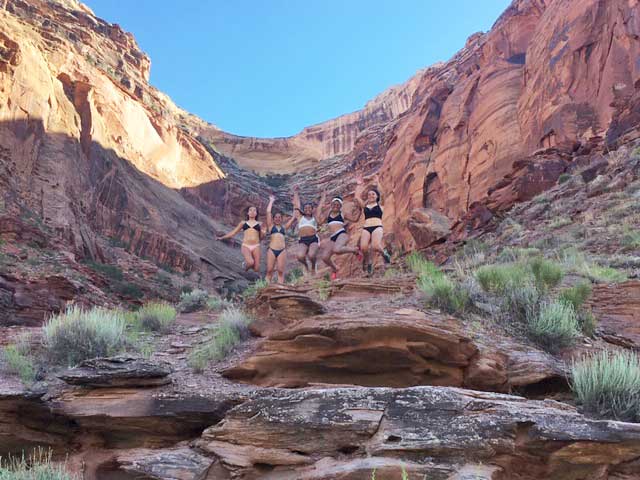
The girls having a good time on the cliffs.
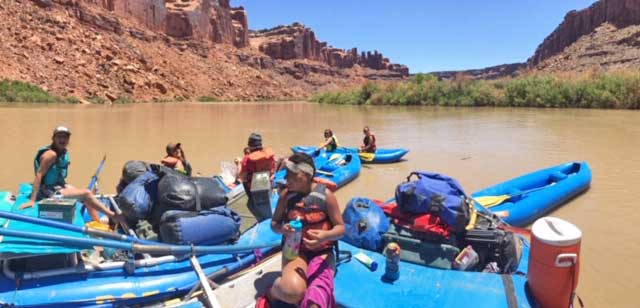
Getting ready to head out on the river.
“We practiced a lot over the many years that we worked at the BOEC together, to meet the needs while providing a quality and effective experience for youth,” says Albert, a New England native. “Bob was a mentor to me. He brought his Outward Bound experiences to the table while I shared the needs of youth and some of my ideas. I didn’t have experience back then, just the passion to do and help. Bob funneled that passion and we really fine-tuned SOAP into a reliable program that has a big impact on the youngsters.”
With this unique collaboration in place, SOAP was born in 1995 and has been a staple of the BOEC Wilderness Program ever since. Any individual, ages 12-18, can participate in the program, but the majority of participants come from the four-county region of the 5th Judicial District – Lake, Eagle, Summit, and Clear Creek counties. Human service agencies, parents, and the judicial district all provide referrals to the program, but at the end of the day, for it to work, Albert says it simply comes down to the participants wanting to do it.
“The focus has always been on building upon the gifts that are inherently within each and every one of us,” says Albert. “When an adolescent has that gift reflected back at them, wow, potential is not only realized, but used to increase self-concept and a sense of purpose in the world.”
BOEC and SOAP are 501(c)(3) non profit organizations that rely on generous donations and/or grants to keep programming available to those that need it. To make a tax-deductible gift, please visit BOEC.org/give or contact Robin Albert at [email protected] today.

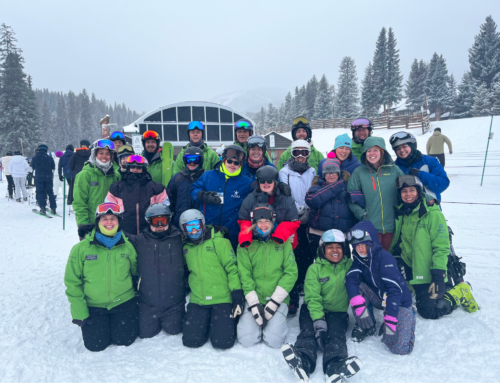
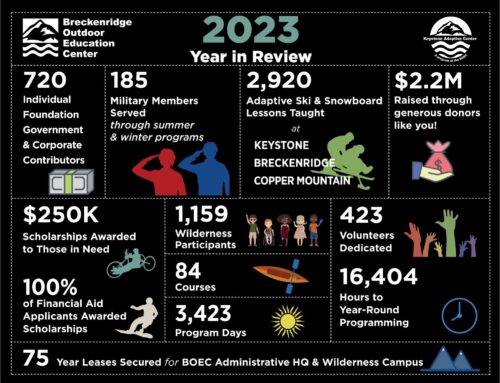
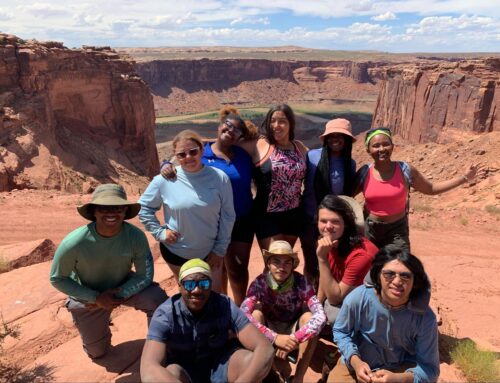

Leave A Comment